Battalions of Evangelism Bring the Gospel to San Marcos, El Salvador
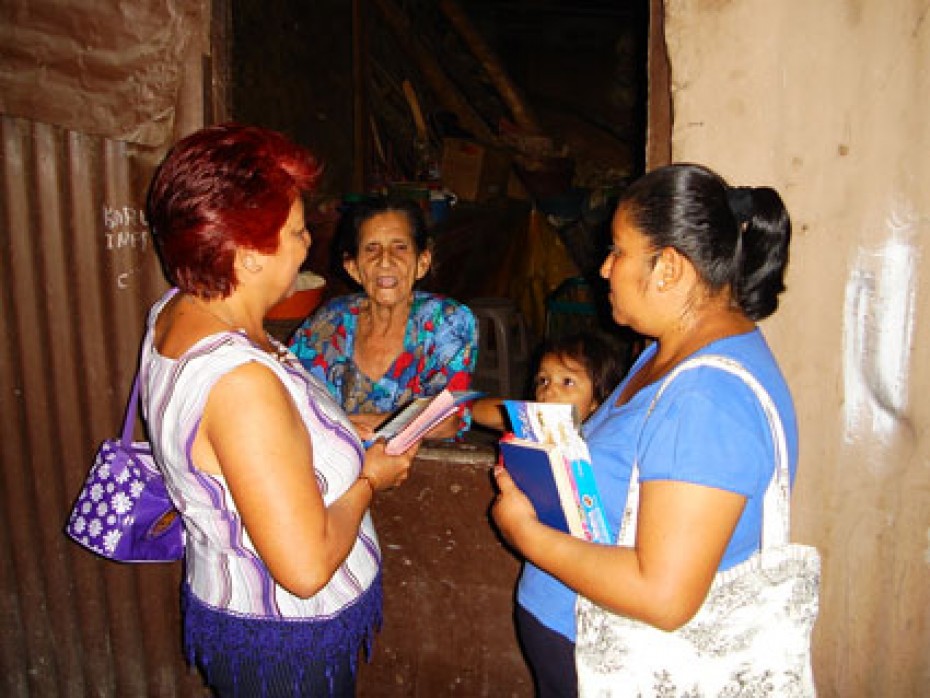
Baptist Biblical Tabernacle has divided its ministries in two groups, internal and external. The internal ministries include the ushers and bible school teachers, as well as mentors for the people who want to learn more from the Bible. The external ministries, as Pastor Edwin describes them, are “battalions of evangelism.” There are different groups that visit hospitals, jails, and the poor communities in the area of San Marcos.
Continue Reading ›What Is Child Sponsorship All About?
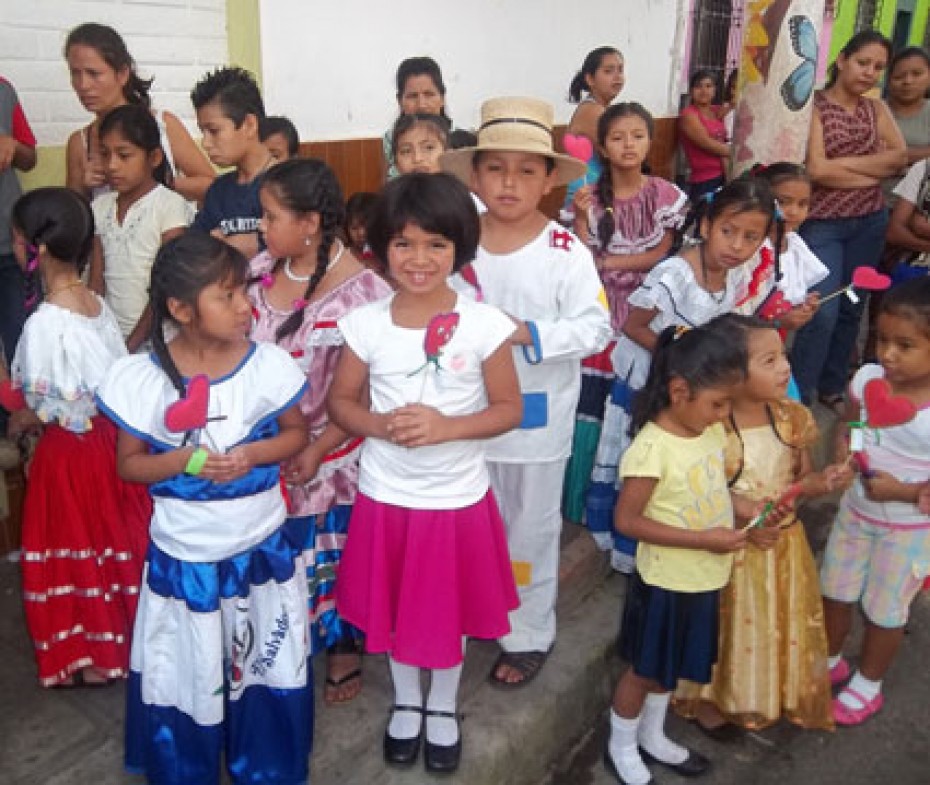
Sponsorship isn’t about us as sponsors trying to save these children; it’s about us working together to save each other.
Continue Reading ›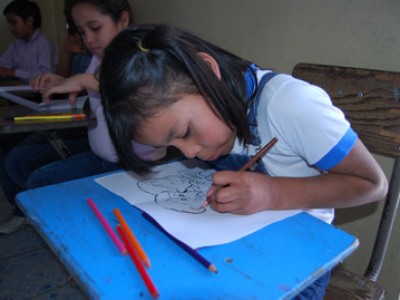
God Is Faithful (Milagro, the Miracle)
Just like her name, it was a miracle that she survived at such a young age. Milagro lost her right arm, and part of her face and body had deep burns. It was a traumatic event for the baby and the mother.
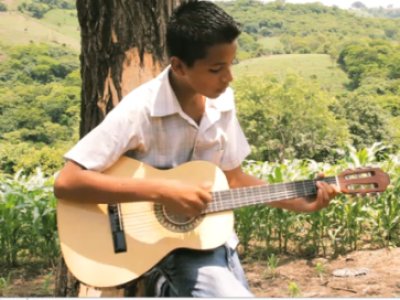
Your Sponsorship Brings Hope: A Report from El Salvador
A frequently asked question about child sponsorship is this: How does it make a difference? People want to know that their concern, their money and their intentions are safe in our hands. This video from El Salvador highlights one of thousands of similar stories that attest to the crucial difference your sponsorship can make in the life of a child!
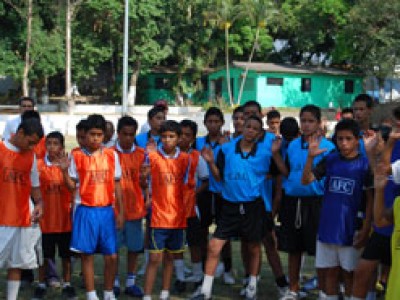
The Next World Cup All Star?
The eyes of hundreds of thousands of people are glued to the field. A commentator narrates the last seconds of the game: “… and there comes Landaverde with a pass from Valdez… Landaverde surpasses the defense quite easily; he aims at the goal… shoots… AND SCORES!!!” El Salvador wins. The people in the stadium shout and celebrate; the national team has won the World Cup.
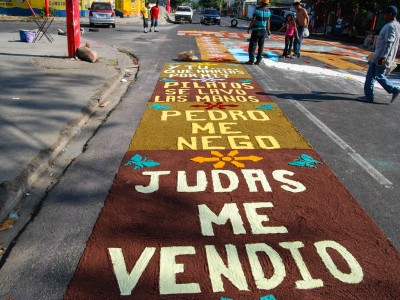
Easter in El Salvador
Easter Week in El Salvador is celebrated differently than the way it is celebrated in the United States. In the United States, Easter often includes the Easter Bunny and egg hunts. In El Salvador as well as many other Central American countries, it is celebrated with a much different atmosphere.
Easter feels like summer. The sun shines strong in the skies, the breeze somehow fresh, somehow warm. It is definitely the middle of the dry season in El Salvador, the equivalent of summer in northern lands. Everything around, from sale signs to music, talks about sun and sand. The opportunity to enjoy beaches that are just an hour away from San Salvador is almost here.
For a full week, students are out of school and have the opportunity to enjoy beaches, visit relatives and do nothing; it is almost the equivalent to spring break in the United States. However, there is one unequivocal characteristic that reminds every Salvadoran that it is not just a break, and that there is more than just sun and fun waiting for us during that week in April.
In El Salvador, the week of Easter is Holy Week, and the festivities revolve around Roman Catholic tradition. Roman Catholics account for nearly 60 percent of the population. Protestant (also called evangelical) churches account for slightly more than 20 percent.
Even though El Salvador does not have an official religion, since the time of colonization Roman Catholic traditions have been the most common and most practiced in the country. Easter Week is the most important celebration for the Roman Catholic Church.
“It is slightly different for the Protestant Church” says Sister Wendy, wife of Pastor Rodolfo at the Baptist Tabernacle Church of Majucla. “For most of the children, Easter Week is an opportunity to spend time with their families. People take advantage of this time to go back to their homeland and spend time with their families.”
One of the most important Easter traditions in El Salvador is Lent. During this 40-day period before Easter, named “Cuaresma” in Spanish, people fast, pray and give alms. The last week of the 40 days is called “Bigger Week” or “Holy Week.”
On Good Friday, there are two major processions. Early in the morning there is the “passion,” which is the representation or commemoration of the walk that Jesus took with the cross toward Golgotha. It is finished around noon.
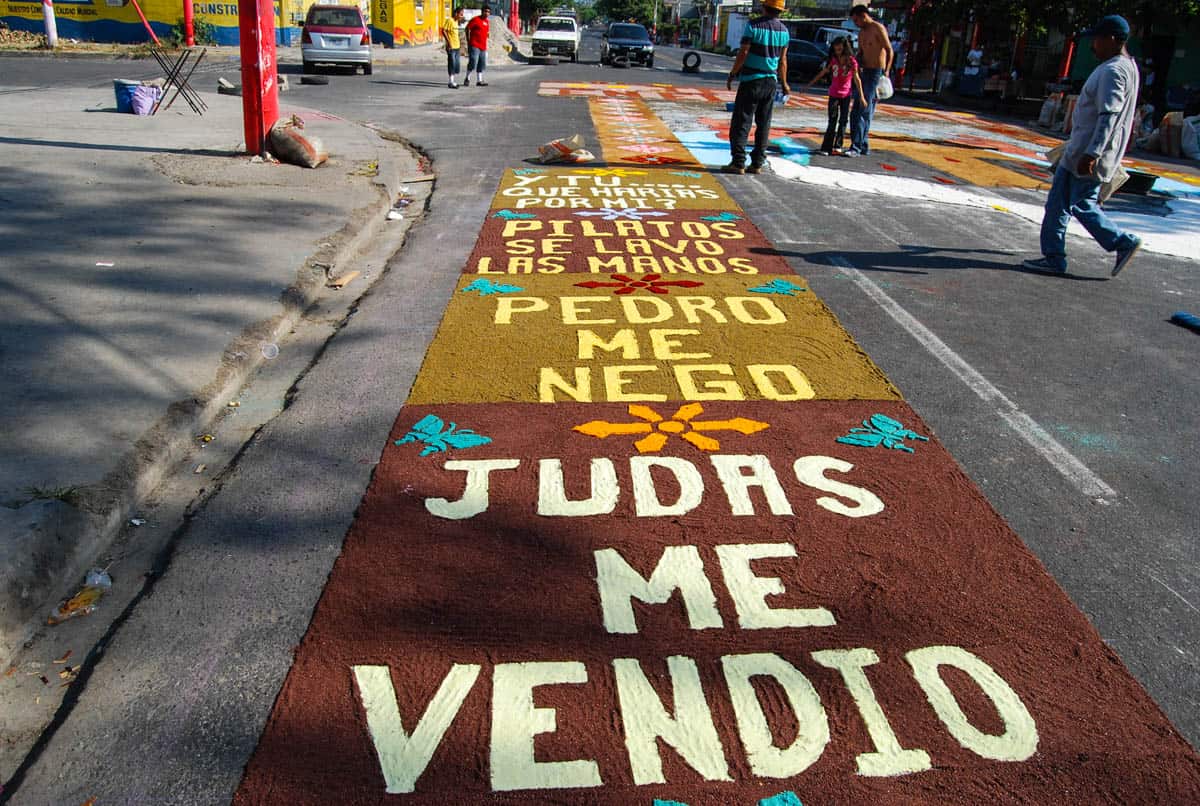
Then in the afternoon, Roman Catholic churches and communities start making rugs on the streets with sawdust, which will later be part of the path where the “holy funeral procession” will pass, carrying the symbolic dead body of Christ.
The making of these rugs represents one of the greatest traditions for the Roman Catholic Church in El Salvador, since entire streets and main avenues in many places of the country are completely closed. The rugs cover entire streets.
Appreciation of the rugs goes beyond religion. For Salvadorans, it is about appreciating the art and about appreciating the effort the people put into making the rugs. For Salvadorans, it is a gift, an offering they are making for Jesus.
Catholic or not, Salvadorans go out into the streets on Good Friday to see the rugs. Apart from this tradition for Good Friday, Holy Week develops differently for Protestants.
For the Evangelical Church in El Salvador, Holy Week is an opportunity to spread the Gospel to as many people as possible. If there is the opportunity to preach the Gospel and carry more people to the feet of our Lord, the church takes advantage of it and tells El Salvador the true meaning of Holy Week.
The Piñata Maker
The community of Montelimar is south of San Salvador, near a town named Olocuilta. The road near Montelimar, which leads to the airport, takes you past a scene that appears desolate. Even though the community has brick houses, electricity and potable water, the desolation of the surroundings and the distance from every other community make it feel almost like a batey or a slum.
The community holds about 2,500 homes, with an average of five people per home, according to the last census Rosario’s church conducted. (Rosario is a Compassion-assisted child in this community.) Most of the families rent space as they cannot afford to pay between $8,000 and $10,000 for a home. Most of them work at factories called maquilas, earning the minimum salary — about $170 per month.
Rent goes between $40 and $50, depending on the condition of the home. For some families, who earn their income as street vendors or have large families, their income barely covers the basic staples, and their option is to inhabit an unoccupied home, with the risk that someday an owner will appear and kick them out.
Sometimes a house will suddenly be empty. The reason lays in the comunity’s biggest problem — gangs.
In poor communities like Montelimar, gangs are a constant threat. Nobody comes in or out without them noticing. In fact, the commercial activity in the community has gone down, and small businesses such as pupuserias (little and simple dining places where they sell a local dish called pupusas) or convenience and staples stores are gone because the gangs ask them for “rent,” which means business owners have to pay a weekly amount of hundreds of dollars to receive “protection.” Otherwise, the gangs will do as they wish with the store and the owners.
In Rosario’s case, her family rents and her father, who sells sandwiches on a little cart on the streets of San Salvador and earns the minimum salary, supports the family.
Rosario is a quiet 12-year-old girl, very shy and organized. She is the oldest of four siblings. Even though she is very quiet, Rosario has many friends at school and at the child development center she attends.
Roberto Medrano: My Best Day in Ministry
Roberto Medrano has worked for Compassion for seven years and now serves as a Learning and Support Specialist for communication and tours in the Central America and Caribbean region.
Sponsor a Singing Bunny!
Apparently, a singing bunny has made its way into our child sponsorship program in El Salvador. The Compassion Bloggers saw it.
Sponsor a singing bunny in El Salvador.
Thanks for the video Patricia.
Leadership Development Program: Getting It Started in El Salvador
“One day, we will see a former participant in Compassion’s sponsorship program lead our nation.” This is the dream that fills the hearts of the Compassion El Salvador staff.
What started in 1977 in El Salvador with the implementation of the child sponsorship program, is now taking a step closer toward that dream.
A few months ago, after a long wait, the Leadership Development Program* (LDP) started to take shape in El Salvador.
At Compassion El Salvador, we always have known there is potential in our future men and women to lead this nation. With the Leadership Development Program in our country, we can work hard to further develop those future leaders. (more…)
10 Questions With Kenia Servellon
1. How long have you been in your current position with Compassion El Salvador, and what is your job?
Two years. I am a supervisor within the Sponsor Donor Services department.
2. What are the main responsibilities of your position?
I make sure the sponsors have up-to-date information about the children. Not just the letters, but also new cases. I keep the biannual report updated. I make sure that pictures and information are high quality and are sent on time.
3. What is an average day like for you? (more…)
Visit Compassion’s Fun Kids Web Site
Are your children pretty web savvy? Do they spend a LOT of time online? I mean are they typical kids? 🙂
How about you? Are you a kid at heart?
If you said yes to any of these questions, we have some exciting news just for you.
We just launched our new kid’s Web site, Quest for Compassion, and we think that it is not only engaging but entertaining too! We love it, and are confident that your kids will as well. Not only is the site fun, but it’ll educate your youngsters all about the ministry of Compassion.

The site is designed for children between the ages of 6 and 10, and it provides a virtual opportunity for them to travel around the world — to four different countries where we work: Ghana, Bangladesh, El Salvador and Brazil.
It helps your kiddos experience a Compassion child development center and the surrounding community, and will give them perspective on what a child’s life in the developing world is like.
Each child will “build his or her own buddy” to travel with — by choosing gender and skin color — and will be able to give the buddy a name. Then they can pick a region of the world to travel to.
Each town and country is filled with objects to click on and games to play. And with the help of their “buddies,” your world travelers can also learn key words and phrases in each country’s native language. Through these various games and fun facts, your children will get to see and hear about the life and culture of our Compassion kids around the globe.
We created the Web site through the use of real-life still shots taken in the countries where we work, which we brought to life through the use of animated children, teachers and animals that your children will meet along the way.

This is a new, fun and safe way for children, and even for you, to learn more about our ministry.
Visit the site today with your children to discover who and what awaits you! And be sure to tell us what you think.

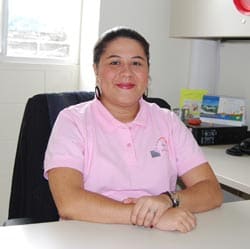 I make sure the sponsors have up-to-date information about the children. Not just the letters, but also new cases. I keep the biannual report updated. I make sure that pictures and information are high quality and are sent on time.
I make sure the sponsors have up-to-date information about the children. Not just the letters, but also new cases. I keep the biannual report updated. I make sure that pictures and information are high quality and are sent on time. 
